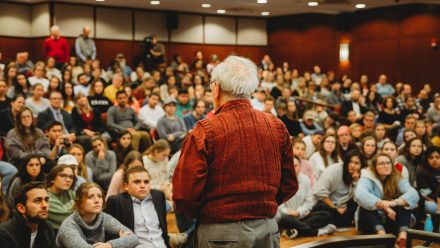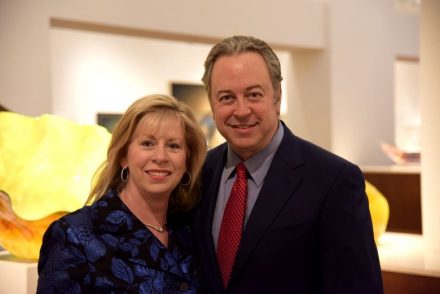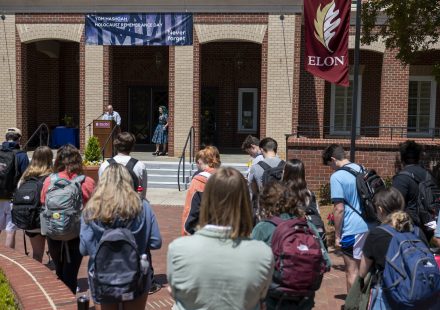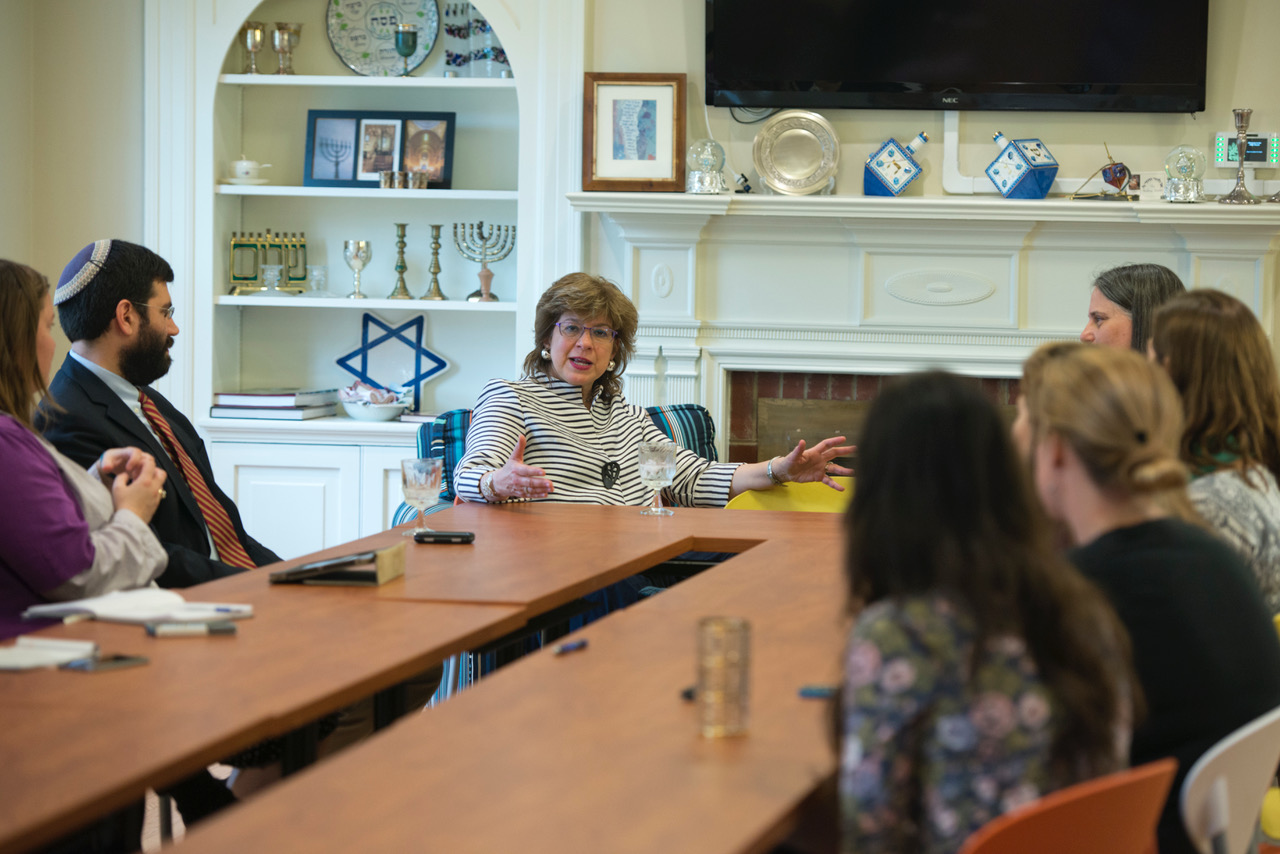University leadership, program founders and current students will weigh in on the program's mission and impact during its first decade.
Elon University’s Jewish Studies Program will host a reception on March 1 to reflect on a decade of growth and achievements in its first decade.
Launched in the 2012-13 academic year, the program has since established connections across the state, nation and world as a hub of interdisciplinary study of varied aspects of Jewish culture and identity.
“Celebrating A Decade of Jewish Studies: Education, Engagement, and Excellence at Elon” will be at 5 p.m. Wednesday, March 1, on the Lindner Hall patio. In case of inclement weather, the reception will be held in the Lindner Hall lobby. The program includes remarks from Elon University President Connie Ledoux Book, Dean of Elon College, the College of Arts and Sciences Gabie Smith, and Geoffrey Claussen, associate professor of religious studies and Lori and Eric Sklut Scholar in Jewish Studies and the program’s founding coordinator. Current program coordinator Andrea Sinn, O’Briant Developing Professor and associate professor of history, will offer words of introduction.

The Jewish Studies program at Elon explores the historical and contemporary experience of the Jewish people. Courses spanning the liberal arts explore Jewish history, language and literature and the diversity of Jewish religious, cultural, philosophical and political traditions. These studies lead students to consider the distinctive ideas and practices of Jewish communities, the ways in which Jewish ideas have influenced and have been influenced by other civilizations, the conditions under which Jews have been the victims of persecution and the significance of the establishment of the State of Israel in the 20th century. It encourages the study of Hebrew at Elon, and it offers a range of study abroad and internship opportunities.
When Claussen arrived at Elon in fall 2011, student interest in Jewish studies was growing. At the same time, Jewish families were working with university leadership to advance Jewish life and programming at Elon. By spring 2012, after meeting with students, faculty, staff and administrators, Claussen developed a Jewish Studies Minor curriculum. The University Curriculum Committee approved the minor that spring, and students began enrolling that fall.
Claussen leaned into partnerships with programs and faculty across Elon to diversify opportunities and events available to students. As inaugural director of the program, and supported by an advisory board of faculty and staff across Elon College, Claussen also intentionally guided the program to provide students with understanding of multifaceted aspects of Jewish history and identity.
“One of our outcomes is that students will be able to discuss the importance of gender, race, national identity and sexuality in relation to Jewish Studies. Those dimensions encourage collaborations across programs, and it’s been important to us that Jewish studies events are co-sponsored by so many different programs at Elon,” Claussen said. “We also want our students to understand how Jewish traditions and identities can be understood in many different ways, including in religious, political, cultural and secular terms.”
Also in spring 2012, Elon parents Lori and Eric Sklut P’14 bolstered the program through an endowment from the Levine-Sklut Family Foundation establishing the Lori and Eric Sklut Emerging Scholar in Jewish Studies. Claussen was the first recipient of that endowed professorship. Later that year, another gift from the Levine-Sklut Family Foundation created the Sklut Hillel Center.

“Watching Jewish studies develop from an idea to a few classes, to even greater exposure across Elon University has brought us much gratification. University leadership, outstanding faculty and engagement across many facets of academia have propelled Elon to national recognition in Jewish Studies,” Lori and Eric Sklut said. “Dr. Claussen has been the center of this tremendous growth, and with his leadership and the surrounding faculty support, he has brought Elon national recognition in Jewish studies. We are grateful to him, to the university, to prior and current leadership, and the board for the continuing support.”
Eric Sklut has served on Elon’s Board of Trustees since 2015. Their son, Mason Sklut, graduated from Elon and the program in 2014.
Melissa Kansky ’13, one of the program’s first three graduates, is now the director of the Columbia Barnard Hillel Grad Network at Columbia University. She often reflects on and draws from concepts, texts and speakers she was exposed to through her Jewish studies courses.
“At the time, the program’s courses aligned with many of the questions I was asking as a college student. The growth in programming and opportunities signaled Elon’s commitment to creating a space where Jewish students are welcome to exploring their identities,” Kansky said. “In my career now, the Jewish Studies Minor has given me broader knowledge from which to pull when talking with students about their understanding of Jewish identity and other areas they are thinking about. It taught me about the malleability of religious interpretation, and to think critically about religion and how it’s used.”
President Emeritus Leo Lambert recalled the organic ways in which the Jewish Studies Program and Jewish life at Elon developed alongside each other with support from the Skluts and other families and Claussen’s leadership.

“The Jewish Studies Program has added a dimension to campus of enormous richness. The power of the work we do here at Elon is our strong grounding in academics that are parallel to vibrant programs of practice,” Lambert said. “It’s difficult to separate Jewish studies at Elon from Geoffrey Claussen, who is a scholarly and intellectual leader, but also the face of the program and its cheerleader. Among his many contributions, the Jewish Studies program is a big part of his legacy at Elon.”
Claussen is especially proud of the quality of undergraduate research completed in the program — including explorations of race, gender and sexuality within Jewish identity, as well as responses to white nationalism. In 2022, for example, Hannah Thorpe ’20 published her research in the Journal of Interreligious Studies and Liora Wittle ’22 published in the Butler Journal of Undergraduate Research. He is also glad that, as early as 2013, Elon was hosting conferences for Jewish Studies scholars and inviting renowned thinkers to campus through the program, and that Jewish Studies programming has continued to expand in recent years.
“The program has flourished under Dr. Andrea Sinn’s leadership over the past five years,” Claussen said. “Dr. Sinn has developed innovative courses and engaged learning opportunities for students, including programming, study away experiences, and outstanding undergraduate research projects focused on the Holocaust.”
Gabie Smith, dean of Elon College, the College of Arts and Sciences, highlighted the program’s achievements and cited the Jewish Studies Program as a model for how to develop interdisciplinary programs.
“Our Jewish Studies Program has excelled not just in academics, but in the relationships faculty have developed with Religious Life and students who identify as Jewish,” Smith said. “Program faculty are recognized on campus and in the field for the very intentional work they’ve done to advance the Jewish Studies curriculum and Jewish Life at Elon. This program is a perfect example of how academics and student life can strengthen the other.”
Along with Sinn as its coordinator, the Jewish Studies Advisory Committee includes Prof. Boaz Avraham-Katz, Jewish educator in the Department of World Languages and Cultures; Claussen; Evan Gatti, professor of Art History; Lynn Huber, professor of Religious Studies, Baris Kesgin, associate professor of political science and policy studies; Kathy Lyday, professor of English; Kim Shively, associate professor of performing arts; and Hillary Zaken, interim assistant dean of Multifaith Engagement.



